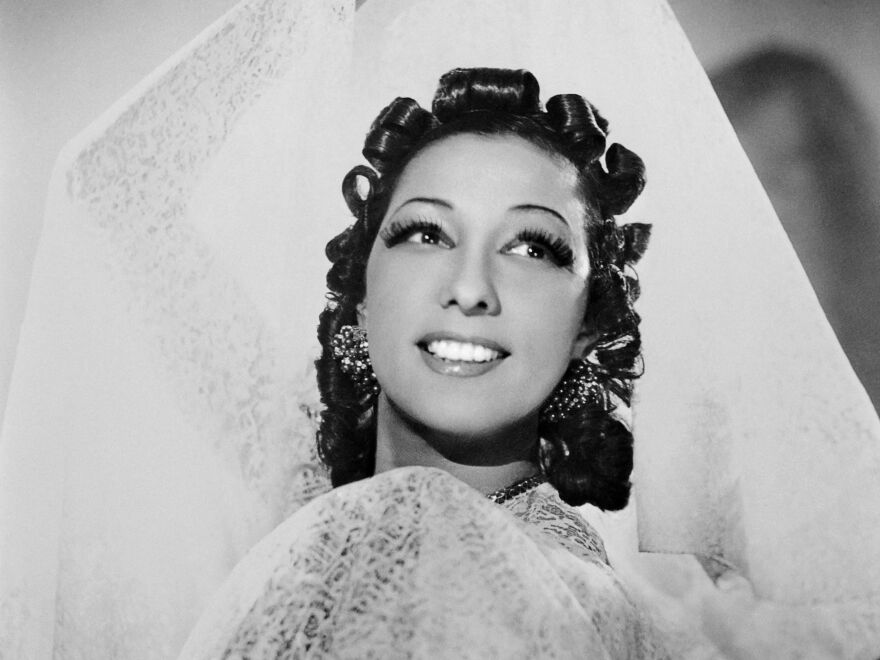PARIS — Josephine Baker, the American-born entertainer and civil rights activist who first achieved fame in Paris in the 1920s and 1930s, was given France's highest honor on Tuesday when she was inducted into the French Pantheon, the nation's mausoleum of heroes.
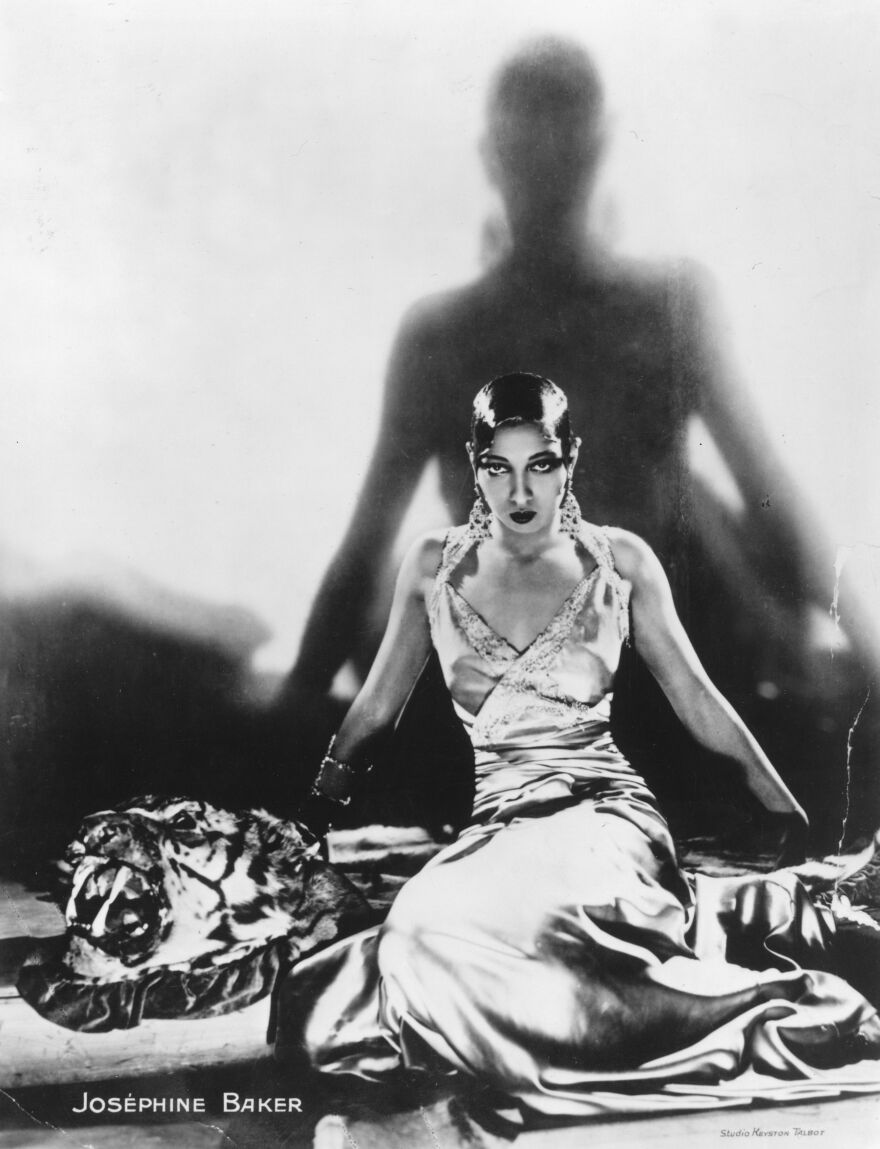
Baker is the first performing artist, first Black woman and first American to be honored with a Pantheon induction — a move whose time, her supporters say, has come.
French President Emmanuel Macron presided over Tuesday evening's official ceremony, broadcast live on French television and which included Baker's family members, politicians, Monaco's Prince Albert II and crowds of spectators. "She broke down barriers," Macron said. "She became part of the hearts and minds of French people ... Josephine Baker, you enter the Pantheon because while you were born American, deep down there was no one more French than you."
Some 80 other luminaries, including Voltaire, Victor Hugo and Marie Curie, are among those buried in the Paris monument. Baker is buried in Monaco, where her body will remain. Her Pantheon presence is commemorated in a plaque on a cenotaph.
The idea of laying Baker to rest in the Pantheon was first proposed in 2013, and gained traction in more recent years as France reckons with racism, its colonial past and questions about the success of its model of social integration.
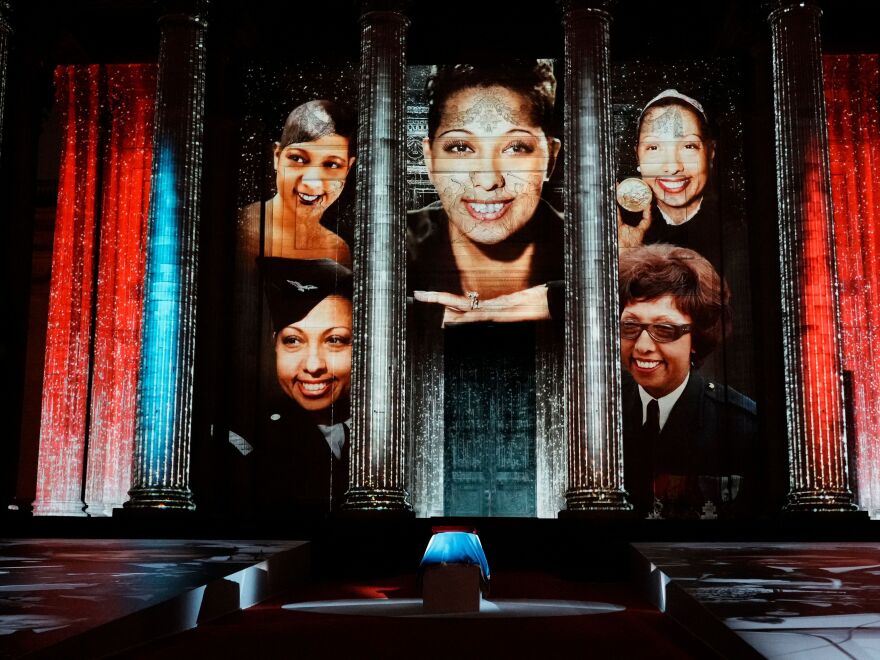
Baker is widely admired in France, but the decision to induct her into the Pantheon has met with some controversy: Critics say that while Baker may have represented France's "universalist" approach — which technically does not identify citizens by race or ethnicity — honoring her does not erase often entrenched racism against French people of African or Arab origin.
Baker landed in Paris at age 19 and quickly became a sensation
Josephine Baker was born Freda Josephine McDonald in 1906 in St. Louis, Missouri. She started work cleaning houses at age eight. At nine, she attended her first live theater performance.
"And she knew immediately that that was what she wanted to do," says writer Laurent Kupferman, whose documentary, "Josephine Baker, a French Destiny," premieres on French television this week.
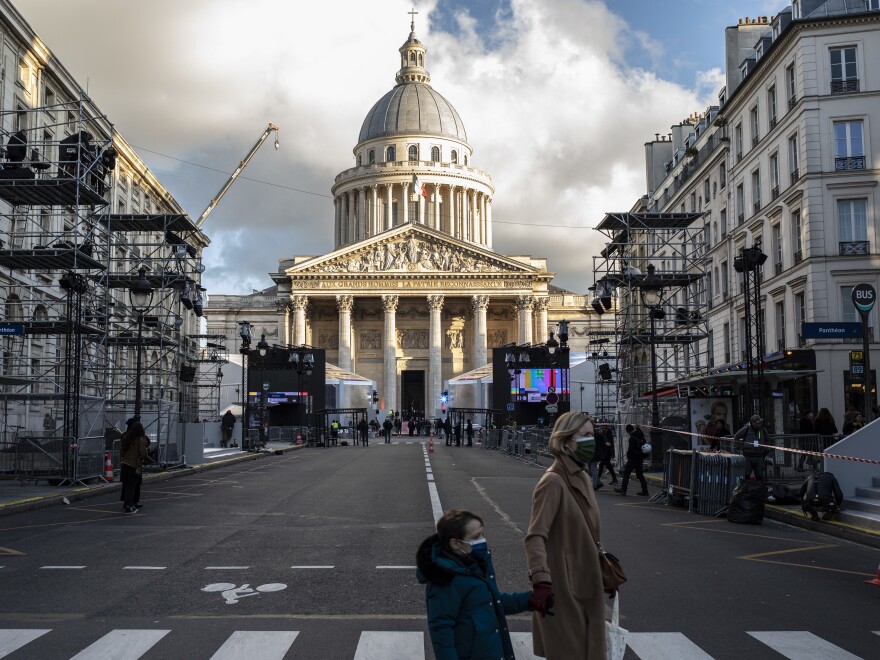
As a teenager, Josephine moved to New York City and began performing with an all-Black dance troupe. She was discovered by a talent scout from Paris.
Baker arrived in the French capital in 1925, at age 19. Kupferman says her love affair with France began almost as soon as she stepped off the boat.
"She takes the train to the Saint-Lazare station in Paris," he says, "and the first thing that hits her is that someone opens the door for her and extends his arm, and it's a white man. And it's the first time that a white person helps her and smiles at her and sees her as a human being and not a Black person."
Baker was cast in an all-Black show called "La Revue Negre." The show was heavily stereotypical and in line with European conceptions at the time toward nonwhites. Baker often danced half-nude, wearing a banana belt. Even so, she maintained her own agency, says French historian Pap Ndiaye.
C’est Joséphine Baker. pic.twitter.com/XjxFYcZMAO
— Emmanuel Macron (@EmmanuelMacron) November 30, 2021
"She mocked those stereotypes," he says. "She took distance vis-à-vis what she was dancing and playing. She was not taking things at face value and she made sure that everyone understood that she was not exactly what people expected her to be. And this was quite an accomplishment for a very young woman who didn't have much knowledge of the society she landed in."
Within a few years, she spoke fluent French and began to sing. The little girl who had cleaned houses in St. Louis became a star in Paris and part of the city's intellectual and artistic elite. Baker became a fixture in shows at Les Folies Bergères, a famous music hall. She was a symbol of the Jazz Age, dominating France's cabarets with her sense of humor, her frantic dancing and her iconic songs like "J'ai Deux Amours" or "I Have Two Loves," referring to "mon pays [my country] et Paris."
She became the first Black woman to star in a feature film, the 1927 silent "La Sirène des Tropiques." She subsequently authored several books against racism.
In 1936, Baker took her show to the Ziegfeld Follies in the U.S. But she was not successful and was once again confronted with Jim Crow laws and racism. "She had to enter show halls from the service entrance, and often she would arrive at hotels to find her reservation was canceled," says Kupferman.
After living free for 11 years, he says, Baker could no longer bear that. Baker returned to France for good.

She worked for the French Resistance during World War II
In 1937, she married the first of three French husbands and became a French citizen. Tuesday's Pantheon ceremony fell on the anniversary of that marriage. She bought a chateau in the bucolic Dordogne region.
Today that chateau is owned by 45-year-old Angélique de Saint-Exupéry, who grew up hearing stories of Baker and, as a young girl, could see the chateau from her own bedroom window.
Saint-Exupéry has spent the last 20 years refurbishing the Chateau des Milandes to pay tribute to Baker. Today it's a national historical monument, visited by more than 100,000 tourists a year.
"It's my present for Josephine," she says. "Josephine adopted 12 children. She fought against racism during all her life, she fights during the Second [World] War. She is an extraordinary woman."

Scouring auctions, Saint-Exupéry collected photos, furniture, playbills and dresses that span Baker's life. Each room of the chateau represents a different epoch. Saint-Exupéry's personal favorite is the "war room," which includes photos, newspaper clippings and Baker's medals.
"When the Germans invaded, she left Paris and took refuge at Les Milandes because she did not want to sing for the Nazis," Saint-Exupéry says.
Baker stashed weapons in the chateau — and also hid Resistance fighters and Jewish refugees. Saint-Exupéry has found some of the hiding places. Baker engaged in the fight for France early, in 1939, before the Nazi invasion filmmaker Kupferman says.
"She went to top military officials and tells them, 'France has given me everything, use me however you want.'"
She performed with French actor Maurice Chevalier for French troops stationed along the Maginot Line. She used her fame to glean information at Axis embassies. She undertook spy missions, Kupferman says, passing easily between the Vichy regime in the south and the Nazi occupied north of the country.
"She considers Vichy an error of history," says Kupferman. "Her man is General Charles de Gaulle. And she puts not only her career, but her life, in danger for what she considers her duty toward France."
She spoke at the 1963 March on Washington
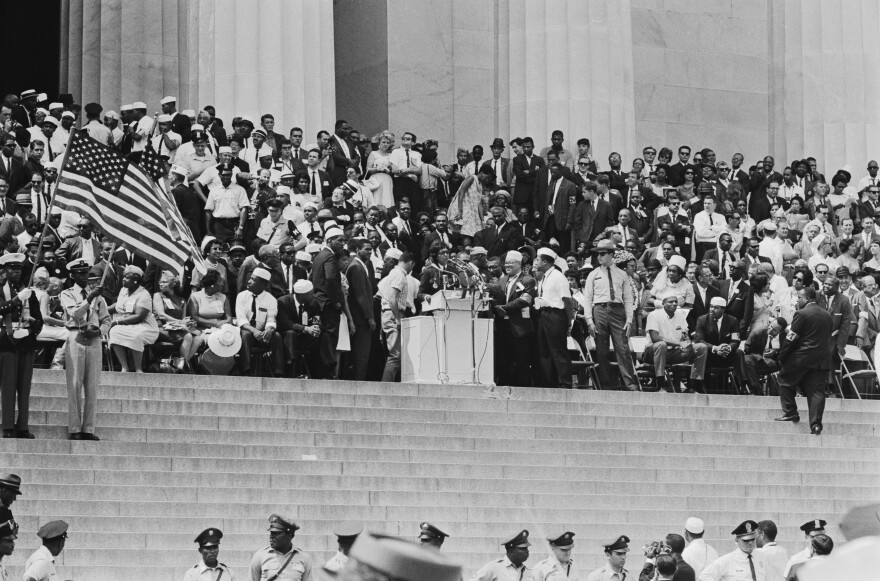
France awarded Baker with various high honors over the years — a French Resistance medal, the Croix de Guerre, and in 1961, upon recognition by President de Gaulle, the Legion of Honor.
Two years later, in 1963, Baker addressed the crowd at the March on Washington for Jobs and Freedom. She wore her French Resistance uniform with the string of medals across her breast.
"When I was a child and they burned me out of my home," she said, "I was frightened and I ran away. Eventually I ran far away. It was to a place called France. Many of you have been there, and many have not. But I must tell you, ladies and gentlemen, in that country I never feared. It was like a fairyland place... when I was young in Paris, strange things happened to me... I could go into any restaurant I wanted to, and I could drink water anyplace I wanted to, and I didn't have to go to a colored toilet either, and I have to tell you it was nice, and I got used to it, and I liked it, and I wasn't afraid anymore that someone would shout at me and say, '******, go to the end of the line.'"
She adopted 12 children from around the world
In the 1950s, Baker turned her chateau grounds into a public park with attractions, and built a luxury hotel and a cabaret. She had plans for a school and much more. Thousands of ordinary people came to visit. Les Milandes also attracted the crème de la crème of European and American society.
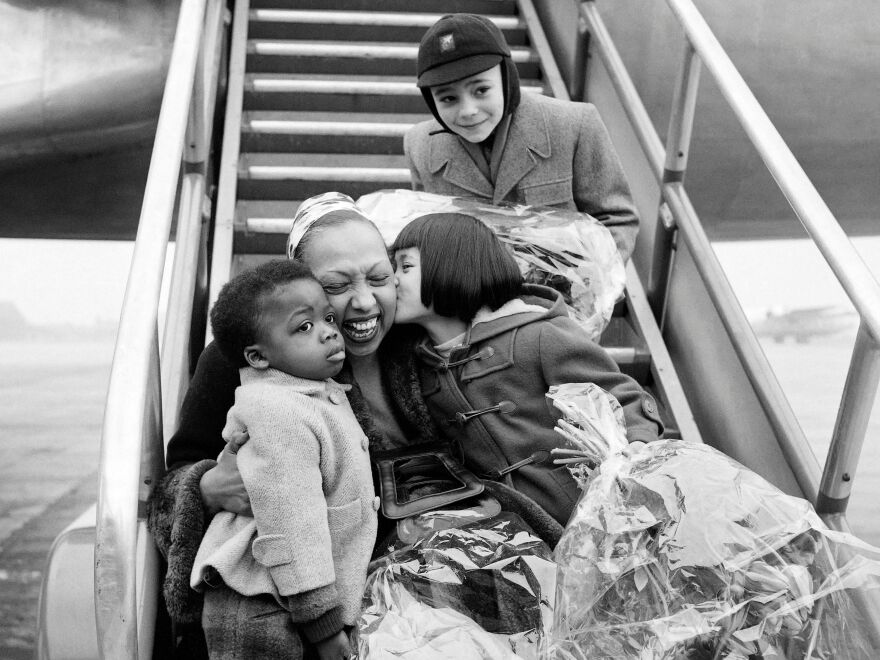
Georges Pasquet was 20 when he got a job at the luxury hotel in 1959. Now 81, he thinks back fondly on those times. He even keeps a photo of Baker on his flip phone.

Pasquet became Baker's personal valet, working for her until 1966. He helped her pack up her dresses to be sent ahead to Paris when she had performances. "The attic of the chateau was filled with dresses," he remembers. "We had to wrap them up and put them in wicker trunks."
Pasquet also helped care for the 12 children Baker adopted from around the world with her third husband, composer Joe Bouillon. Baker had boundless energy, he says.
"She would sleep three or four hours a night and that was all she needed," he says. "She would sometimes ring me at four in the morning and say 'Georges, I need you to come down so we can go over the plans for the day.' And I didn't even have time to dress. I would go down in my bathrobe."
Pasquet says when Baker traveled the world – New York, Marrakesh, Tokyo – he was in charge at the chateau. He says she always wrote home and he has kept all of her letters.
"She always inquired about the staff and would ask me about my parents," he says.
Despite her own hardships — Baker encountered mounting debt problems — Pasquet says she was attentive to others and what was happening in their lives.

Baker wanted to show that racial and cultural harmony were possible
Baker called the children she adopted her "rainbow tribe." The family became part of French popular culture in the 1960s, featured in magazine ads for clothing and soft drinks.
Brian Bouillon Baker, one of her children, was adopted from an orphanage in Algeria, where she performed during that country's war of independence from France.
"She changed my life," he says. "Growing up with 11 brothers and sisters at the chateau was kind of like a permanent summer camp, with kids always shouting and playing. It was a bit crazy. But it was also strict. My mother wanted us to have a very good education for our future."
His mother also wanted to show the world what was possible with her rainbow tribe, he says: "That children coming from different parts of the world with different religions and different cultures — that it was possible to be brothers, to have a kind of universal brotherhood."
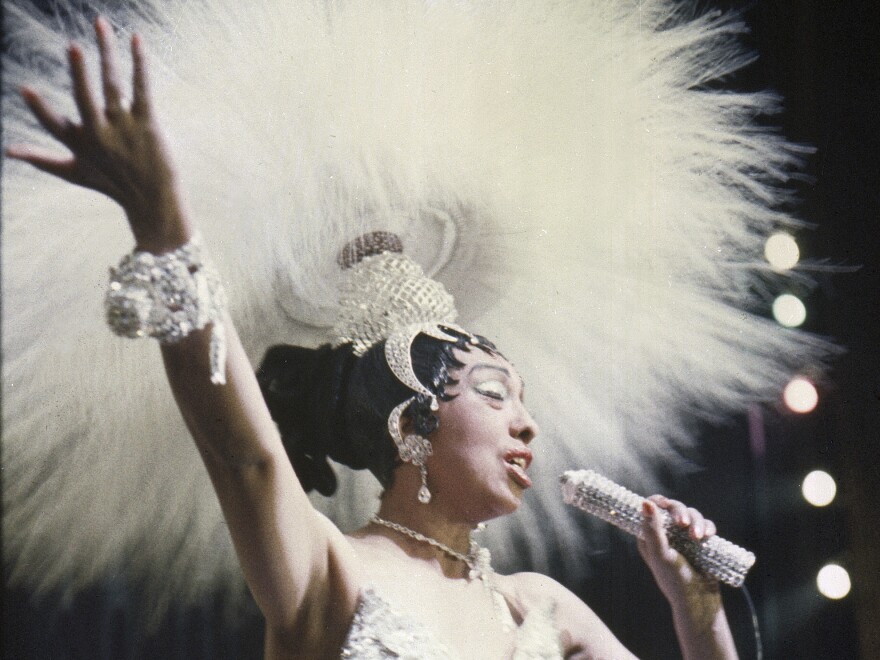
She succeeded, he says. Today the 12 siblings are still close, and there are large family reunions with second and third generations.
Their mother collapsed after performing at a concert in Paris in 1975, and died several days later at age 68. Thousands of people lined the streets for her funeral at the Madeleine church, where she was given military honors.
Pasquet, her former valet, signed the petition in favor of her induction into the Pantheon and says no one deserves to be there more. Chateau owner Saint-Exupéry says she always wanted Baker to be a permanent part of French history. And now she will be.
Copyright 2021 NPR. To see more, visit https://www.npr.org.



